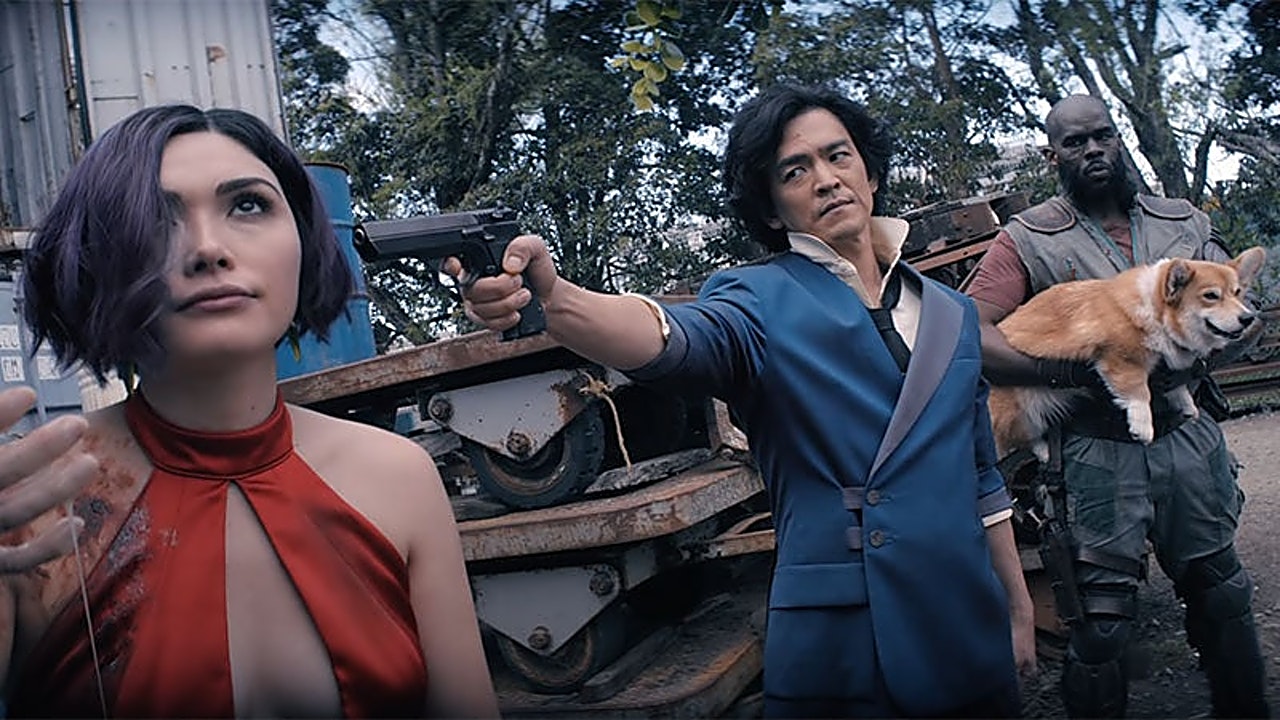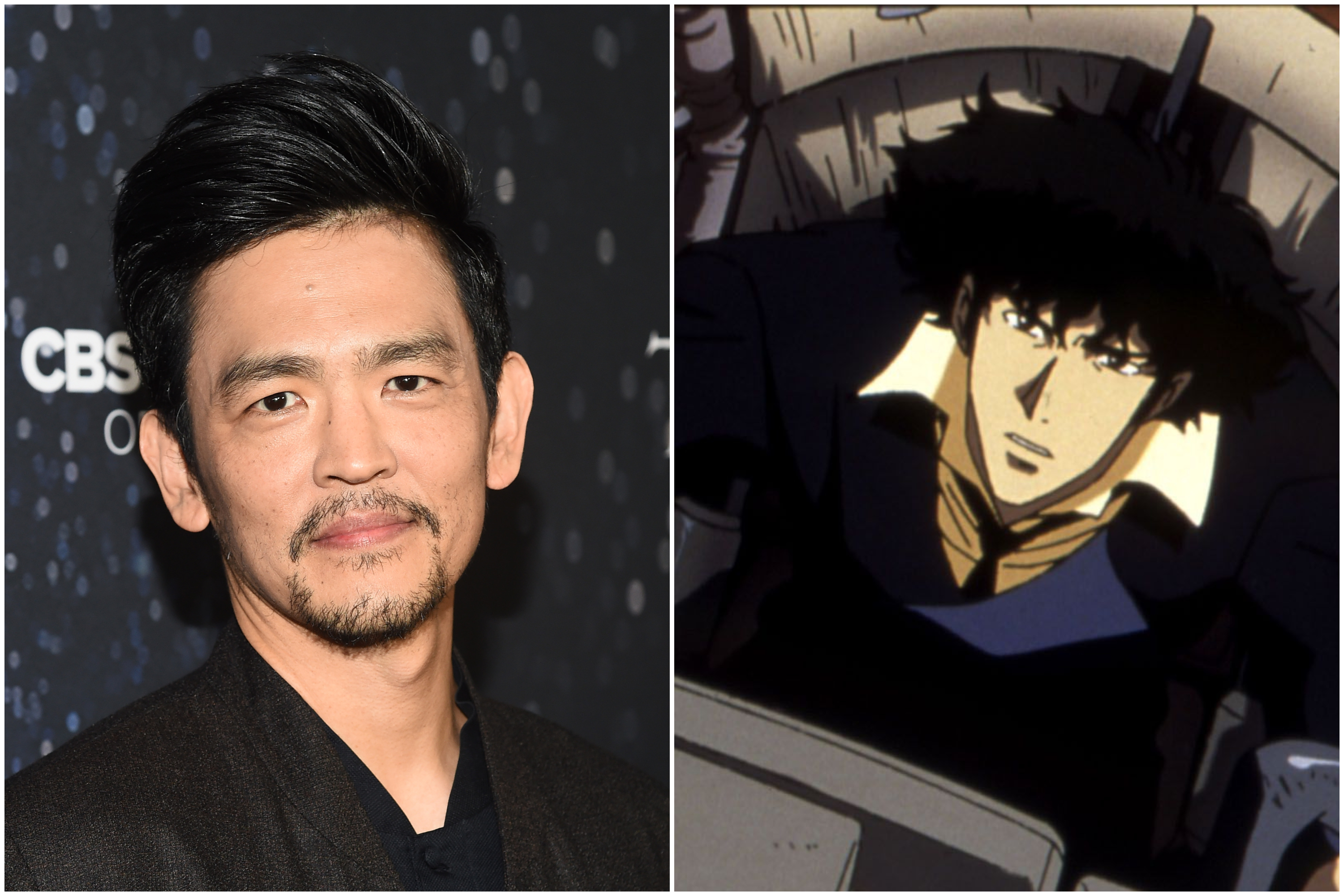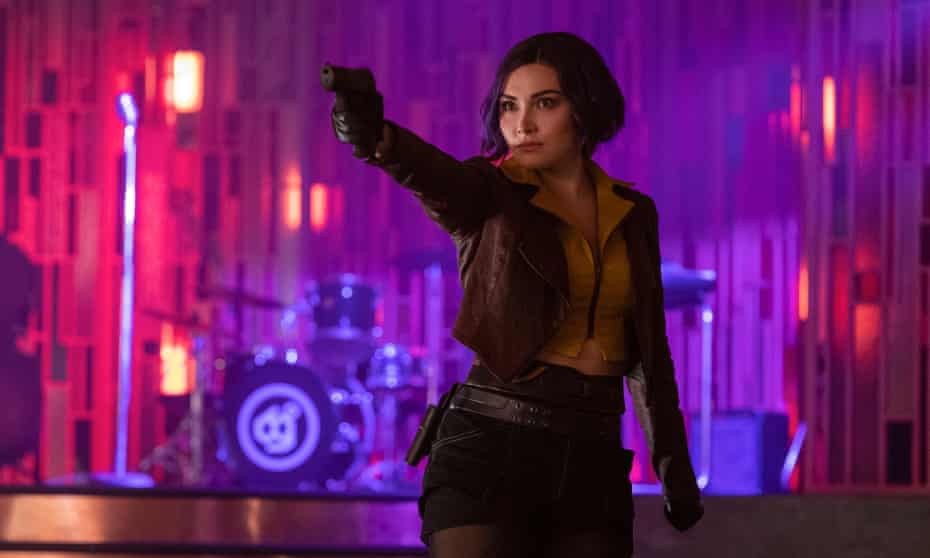The live-action remake of the beloved anime Cowboy Bebop has – after a lengthy production – finally hit our screens. How does it compare to the original?

We open with a robbery. A glitzy casino is held at gunpoint by a group of thieves who may or may not be under the influence. While an animated discussion between two of the robbers heats up, we hear the faint “ding” of an approaching elevator. The door opens and Spike Spiegel – suited and suave – approaches. “What are you doing here?” one of the thieves asks. “Me? I’m here to place a bet.” He flips the coin and jumps into the air like Bruce Lee to kick it into the forehead of the leader.
This is our first look at Netflix’s long-gestating attempt to translate the seminal anime Cowboy Bebop into live-action. What follows is a bit of a mixed bag . Some elements are very strong, while others feel like the tinkering went a little too far. Translating this strange, anachronistic, often dangerous world from its animated form into a believable live-action format was always going to be a challenge. This iteration of the world and its characters is nearly a success. But suffers from some of the pitfalls all too familiar to adaptations of this format.
A lot of questions going into the project were in regard to the plot. Would it be a straight remake? A sequel series? A reboot? The answer is perhaps best described as a remix. Some of the most iconic imagery and scenes from the original are copied over wholesale. Plot elements and some of the dialogue are also recycled. But one of the more clever aspects of this adaptation is taking these elements and reworking them, as well as creating new backstories and scenarios for these characters to deal with.
Characters
And that is one of the strongest elements of this adaptation – the characterisation, and the casting. John Cho manages to channel Spike’s cool, detached demeanour while still injecting him with enough personality to make the audience care. While this kind of wise-cracking character is in Cho’s wheelhouse, it is backed up by an impressive physical transformation, highlighted by a training scene where his character is seen shirtless – and has undergone a Marvel-esque change. Mustafa Shakir is also a highlight as Jet Black, the voice of reason on the crew. He is decidedly less cool than Spike or Fay, more fitting the role of mother hen to the younger, more reckless crewmates. A role that can be thankless but Shakir makes Jet likeable and fun. Daniella Pineda isn’t given as much to do as the other two, but makes the most of the material she has. Fay makes an immediate impression, meeting the other two while they’re all after the same bounty . And her lack of a back story is one of the most intriguing mysteries of the season.
Unfortunately, the effective translation of the core three does not extend to the periphery and villainous characters. The villainous characters suffer here in particular. Vicious was an interesting character in the original due to his wordless pursuit of Spike – appearing occasionally as a force as menacing as he was mysterious. The decision on the part of the showrunners to fill out his back story and make him Spike’s adopted brother largely misses. The character is very badly written and plays like a petulant man-child as opposed to his brooding, katana-wielding animated counterpart. Nor is the writing helped by a pretty over the top performance from Alex Hassell.

Design
Another thing this adaptation excels in is the overall production design. There are some issues. It appears a lot of the budget was spent by the time the 7th episode rolls around, as there seems to be a marked dip in the quality of sets and other elements past this point. The aesthetics are for the most part on point. Of particular note is the character’s costumes, which are nearly one-for-one translations from their animated roots, and the aesthetic of the Bebop – a character in her own right – is also lovingly recreated from the source material.
Also pleasing is the fact they brought back original series composer, Yoko Kanno, to do the music. For a world primarily set in the future, Jet and Spike love music from the first half of the 20th century – Jet with jazz and Spike with the blues specifically. Kanno is a fantastic musician, and her band Seatbelts handle many of the jazzier numbers. They’re re-recorded for the production but sounding just as good as they did for the original run of the show.
Something Missing
For all that it gets right, it feels like there’s something missing from this adaptation. It took me a while to put my finger on exactly what, and other fans may have different interpretations. But I think what this adaptation misses is the heart present in the original. The “Marvel effect” can be seen on full display here, as any moment that veers too close to an emotional catharsis or growth for a character is invariably undercut with a gag. On that subject, while the writing is mostly solid, some of the humour comes across as downright juvenile. One scene in particular with a German domnatrix wouldn’t be out of place in a Judd Apatow sex comedy.
While the original has its moments of humour, it never undermined the more earnest and heartfelt parts of the story with it. While this might be fashionable storytelling, it ultimately proves a disservice to Cowboy Bebop, as one of the standouts of the anime is its earnestness. In an effort to look “cool” the adaptation glosses over the more existential, weird elements of the anime, replacing them with simplified versions of the more complex points the anime would take time to contemplate.
Worth a Look

Ultimately, Netflix’s take on Cowboy Bebop is a fun ride. There are some storytelling choices that I found quite strange as a fan of the original (making Jet an actual Dad for example, which feels in places like an excuse to stretch out some episodes with his “absentee father trying to make it work” shtick. He has two kids to worry about on the Bebop). And some of the humour is at best ropey and at worst cringe-worthy.
Those problems aside though, it certainly looks the part and is charming enough to sustain the audience over its ten-episode run. If you have a friend who flat-out refuses to watch anime because “it’s for kids” then this might be the thing that – much like its predecessor – can be used to convert them.
Cowboy Bebop is streaming on Netflix now.
Subscribe to FIB’s Weekly Breaking News Report for your weekly dose of music, fashion and pop culture news!







